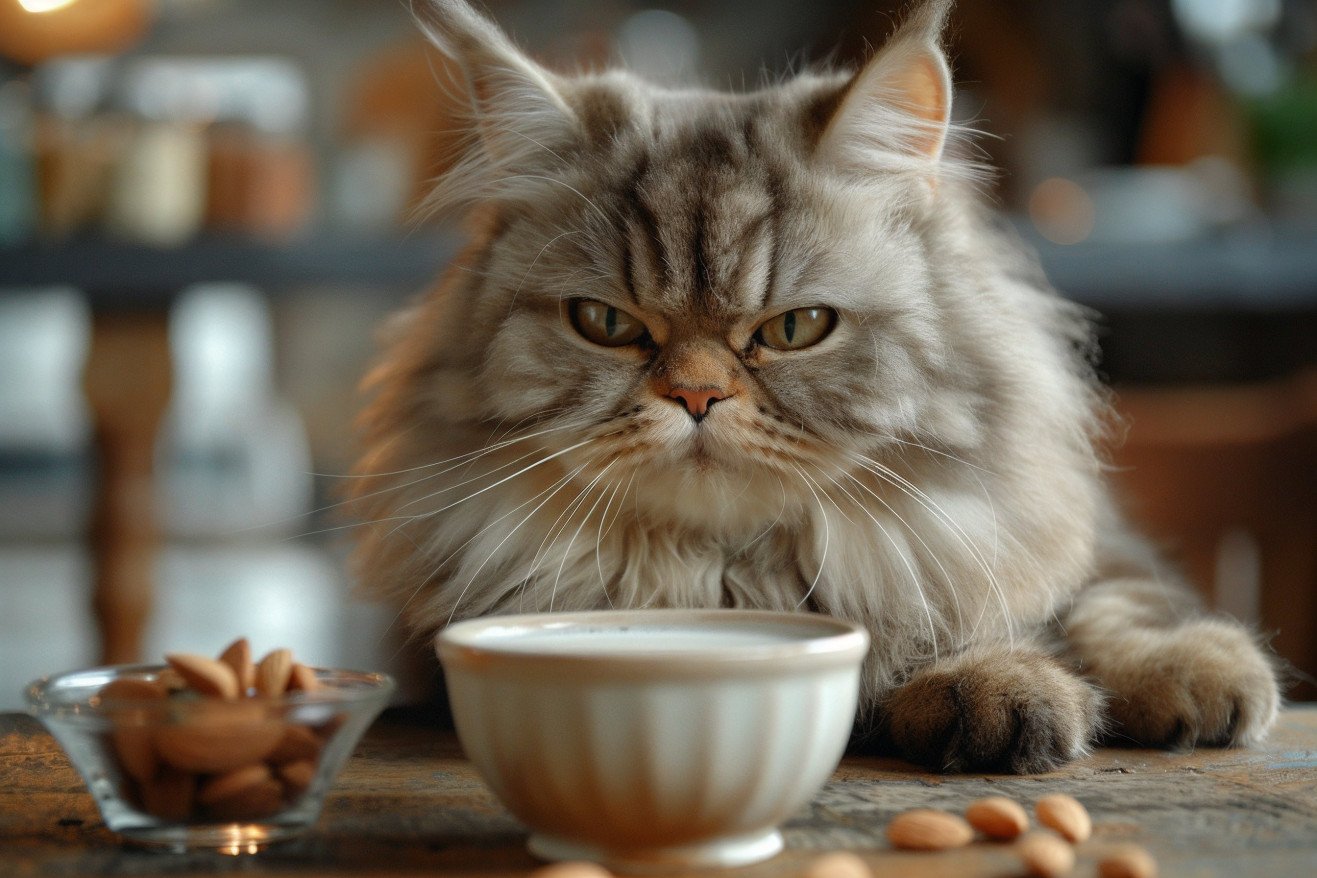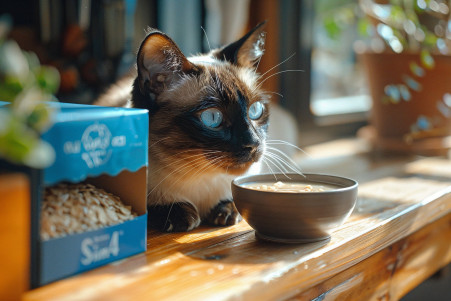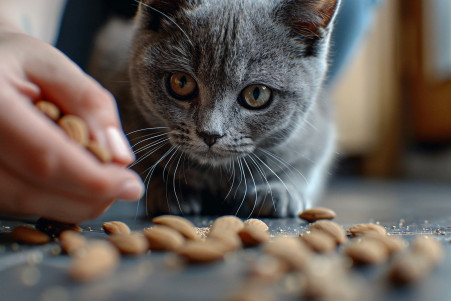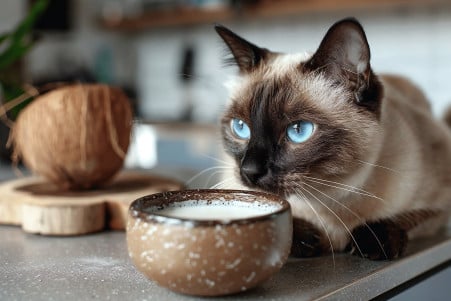Can Cats Drink Almond Milk? What Cats Need From Their Diet
15 February 2024 • Updated 14 February 2024

Almond milk is a popular alternative to cow’s milk, but is it a good alternative for your cat? While cats can have almond milk, it’s not particularly nutritious and can cause digestive upset.
In addition, because it’s high in calories and free of lactose, almond milk can contribute to obesity in cats. If you want to give your cat almond milk, make sure you talk to your vet first and give it to them in small amounts.
This article will use information from veterinarians and research to explain the ins and outs of a cat’s dietary needs. It will also explain how cats’ digestive systems work and how that affects their ability to digest non-dairy milk, like almond milk.
By learning about cats’ lactose intolerance and other dietary needs, you can make sure that you’re making the best choices for your cat’s diet, and that you’re keeping them as healthy and happy as possible.
Can cats drink almond milk?
Almond Milk and Cats: A Nutritional Incompatibility
Nutritionists have pointed out that almond milk is low in protein and lacks the essential amino acids that cats, as obligate carnivores, need.
The ASPCA explains that cats need certain nutrients, including proteins, amino acids like taurine, fats, and water to be healthy, and most of these nutrients are found in animal-based sources, not in plant-based drinks like almond milk.
Meanwhile, the UK Pet Food Industry Association highlights the importance of taurine and arginine, both of which are missing from almond milk. This difference in nutritional content makes it clear that almond milk doesn’t contain the complex nutritional profile that cats need.
In addition, while almond milk is low in calories for people, for cats, it’s the opposite. It’s high in calories and low in the nutrients that cats need, which can lead to obesity, according to the ASPCA.
The UK Pet Food Industry Association also points out that cats have much shorter intestines than dogs, which means they are less efficient at digesting plant material, compounding the problem. As a result, a diet high in almond milk could lead to a lack of nutrients that could negatively impact a cat’s health, including their eyesight, heart health, and ability to reproduce.
Understanding the limitations of almond milk in a cat’s diet helps to put their digestive system in context.
How Cats Digest Food and Their Natural Diet
Cats are obligate carnivores, which means their digestive systems are designed to process animal protein. In contrast to omnivores, cats have a shorter digestive system and lack the enzymes needed to effectively digest the complex carbohydrates in plant-based foods.
A paper by Zoran in Veterinary Sciences explains that cats have a limited ability to digest starch and are therefore naturally adapted to a low-carbohydrate, high-protein diet, with most of their protein coming from animal sources.
These physiological limitations are important to keep in mind when thinking about feeding cats non-traditional foods like almond milk. Almond milk’s digestibility in cats is in question because it has a nutritional composition that is very different from what a cat’s digestive system is designed to handle.
A study published in the journal PLOS ONE found that cats can digest plant proteins better than dogs, but that plant proteins are still less digestible for cats than animal proteins.
This research suggests that almond milk and other plant-based milk alternatives may not be well-suited to the traditional feline diet, which is high in animal proteins. As we’ve looked at lactose intolerance and the different types of milk, it’s important to remember these basic differences in the way cats digest food and the nutritional composition of their natural diet.
Lactose Intolerance in Cats and the Case for Almond Milk
Lactose intolerance in adult cats is the result of a lactase deficiency, which is the enzyme that breaks down lactose in milk. According to WebMD, this is common, as kittens lose the ability to digest lactose after they are weaned. As a result, dairy products can lead to stomach upset and diarrhea in lactose intolerant cats. This has led some people to consider lactose-free options like almond milk.
However, even though almond milk doesn’t contain lactose, it may not be safe for cats. According to Catster, almond milk is lactose-free, but it’s high in fat and oil, which can cause digestive problems and even pancreatitis in cats. In addition, ResearchGate reports that cats are attracted to the fat and protein in milk, which may make almond milk appealing to them, even though it’s not good for their digestive systems.
As a result, while almond milk may be a good option for lactose-intolerant cats, it’s not nutritionally complete and may pose health risks. This is important to keep in mind when choosing treats for cats, especially since their health and safety should always be the top priority.
What Do Vets Say About Almond Milk in Cat Diets?
Veterinarians tend to warn cat owners to be careful about adding almond milk to their cats’ diets. As Pets Best points out, while almond milk is not toxic to cats and can be given to them in small amounts, it is not needed and has added calories that can lead to obesity.
The Association for Pet Obesity Prevention agrees, noting the dangers of empty calories in pets. Anecdotal evidence, including the story of 22-year-old rescue cat Stella, suggests that some cats may enjoy almond milk without any immediate problems.
However, a report by Pets WebMD says that while almond milk is not toxic, it can cause stomach upset and lead to obesity.
Cats that are fed almond milk regularly over the long term may face health problems due to its high-calorie, low-nutrient content, including a lack of essential nutrients such as proteins and amino acids like taurine, which are important for their health, as shown in research on the importance of taurine in feline nutrition.
Vets recommend that cat owners only give their cats almond milk as an occasional treat, if at all, and that they never give it to them with sweeteners or other potentially dangerous ingredients.
Doing so will ensure that while cat owners can occasionally satisfy their cats’ desire for new flavors, they also ensure that their cats are eating a balanced, nutritious diet, free from high-calorie, nutritionally void treats like almond milk.
Healthy Snack Options for Your Cat
If you want to give your cat a treat, it’s best to stick to options that are more in line with their nutritional needs than almond milk, which is high in calories and low in nutrients. Instead, you can choose safer options like crunchy cat treats that are made especially for cats, which are not only more nutritious but also more appealing.
Catster also recommends giving your cat a little pet-safe peanut butter as a treat because cats love the taste and texture, but make sure to keep the portion small to avoid giving them too much fat.
When you do give your cat treats, make sure to introduce them slowly and watch for any signs of an adverse reaction, like an upset stomach or a lack of interest in food. It’s also important to make sure your cat is getting a balanced diet. Treats should only make up a small percentage of your cat’s daily calories.
In addition, make sure to use treats in moderation and choose options that offer other benefits, like helping to keep your cat’s teeth clean or aiding in hairball control, to avoid high-calorie options like almond milk.
To make sure you’re giving your cat treats that are in line with their carnivorous diet, make sure to choose treats that are formulated to meet their nutritional needs. This will allow you to treat your cat in a way that’s both safe and healthy while keeping their best interests in mind.
Conclusion: Can Cats Have Almond Milk?
So, while almond milk is not poisonous to cats, it is not a good fit for their nutritional needs. Cats are obligate carnivores and need a diet that is high in animal protein. Almond milk is plant-based and does not contain the essential nutrients that cats need, like taurine. It can also cause digestive upset and obesity because it is high in calories and low in nutritional value.
As always, talk to your vet before adding anything new to your cat’s diet, including almond milk. They can give you personalized advice based on your cat’s individual needs. Being a good pet owner means being informed about your pet’s diet and making sure that any treats you give them are safe and contribute to their overall well-being.
As cat parents, it’s our job to find a balance between treating our pets and making sure that we are meeting their nutritional needs. When choosing treats, make sure that they are tailored to the specific dietary needs of our feline friends so that they can live long, healthy lives with us.


